The Propaganda Campaigns For and Against Online Privacy
These are the ads that shape the way society sees privacy. I review a few of them.
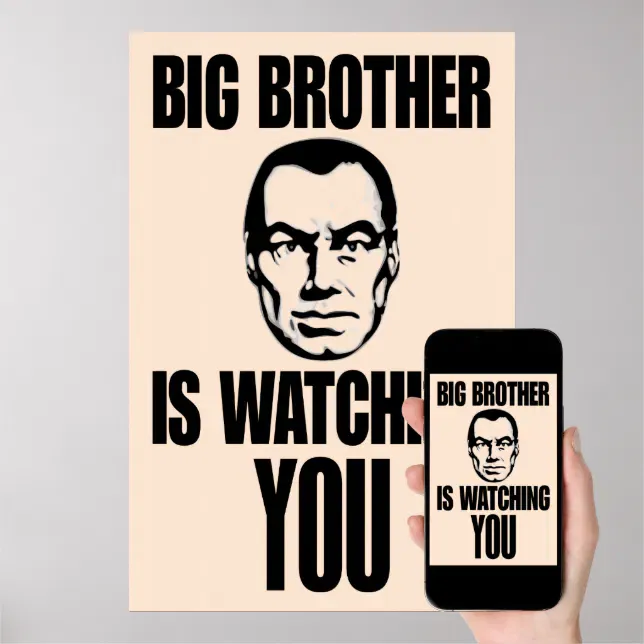
Since I was a little kid I always liked ads. I still do and I don't really know why. I know on a rational level that ads are there to in some way manipulate you and to get you to do something you wouldn't normally do. They are by design manipulative, and seeing myself as a strong-willed, independent person, it should mean I ought to despise them.
Despite this, I cannot help but admire the simplicity of ads, how clear-cut their purpose is. They are not like movies or books that are trying to stir up emotions in service of illuminating some truth concerning the human condition. They are simpler and tug at emotions to only one end: to get you to act. An advertisement is an invitation to buy into the mini-truths of a micro-reality, calling upon the images and memes of a shared cultural heritage and defined in most part by the society that allows and creates them. It is their narrow domain though, that of getting you to act some specific way, that makes them so fascinating to me. It's propaganda that is socially acceptable to buy into.
As I was thinking about this topic on the bus to work I began to wonder what kinds of ad campaigns are there regarding my pet political cause, online privacy. There is a lot to choose from, mostly from the post-Snowden era where the cat was out of the bag and companies had to regain the trust of consumers who had become wary of data harvesting websites.
Here I've selecting a few ads from the last 5 years. I give a little context before giving my free-form artsy opinion on the kinds of emotions and images come to my mind when viewing them. Hopefully you'll come away with a new appreciation of the amount of effort that is put into winning your heart and soul in these new Crypto Wars we find ourselves in.
If it wasn't clear, just to be transparent, I think online privacy is a vital human right and that WE NEED TO FIGHT ChatControl 2.0. I also want to make say the following outright to start with: the abuse of children is abhorrent and I want society to fight for the safety of children online. What I take issue with is that banning or limiting end-to-end encryption is not going to help protect children all that much but instead offer governments a way to surveil us in a way that will have a silencing effect on public discourse. I believe that many of the parents that are advocating for encryption restrictions have their heart in the right place and are genuinely concerned for the well-being of children. Despite some my harsh critisisms of the ad campaigns to follow, I have no ill-will toward any of the parents participating in these campaigns.
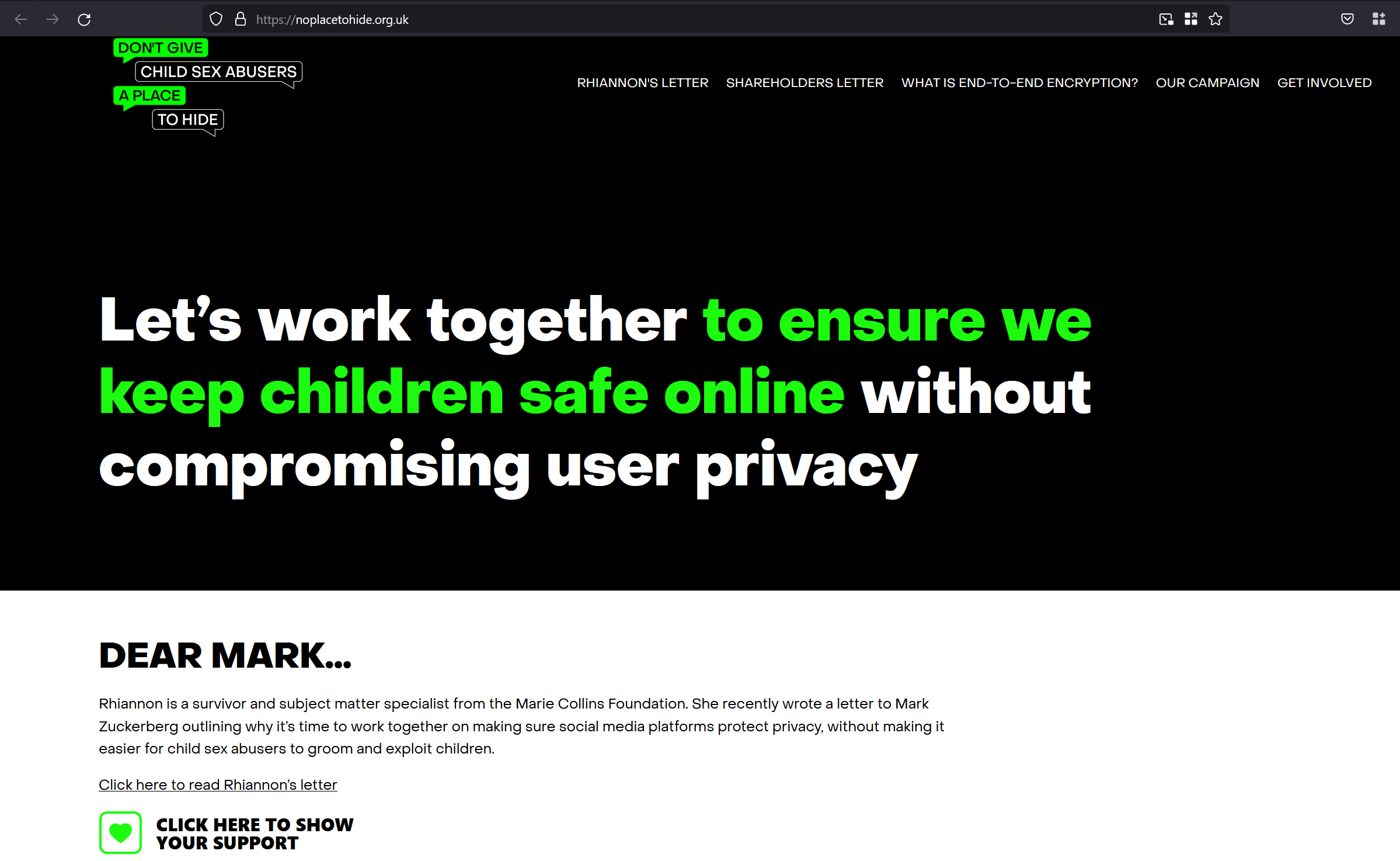
The first advertisements I want to start with is #noplacetohide, a campaign using concern for children's safety to push the restrictions on end-to-end encryption. This campaign was created by the famed M&C Saatchi ad agency with the cooperation of the UK government in their push to curtail online privacy with the Online Safety Bill. The bill was passed by Parliament and we are still to see what kinds of effects this bill will have. The EU is facing ChatControl 2.0 and in the US the EARN IT act threaten online privacy on a fundamental level, so this ad campaign has a way larger audience than just British parents.
The site has simple bold lettering and green/black/white color palette. The green stands out against the black and might also be there to remind us of the green message bubbles that Android messages appear as on iPhones.
The video above is showing a conversation between a child and a predator being sneakily hidden away by the grim, arcane mathematics of cryptography. You as the viewer have been robbed of agency, you cannot stop something you know nothing about. The solution to this problem is obvious: why can't encryption have an exception to protect children? The other alternative protects the predator, is that what privacy advocates really want, in their heart of hearts?
This response is by design. Protecting a child is simple, understanding the reasons why exceptions to end-to-end encryption cannot be reliably implemented is hard.
The bold color choices make the otherwise mundane bubbles of a text exchange pop out, but this is still depicting something so ordinary and routine. We all stare at these bubbles every day at work and at home as we send messages to collegues and loved ones. To think that these little, normal balloons can carry such poisonous words is paralyzing.
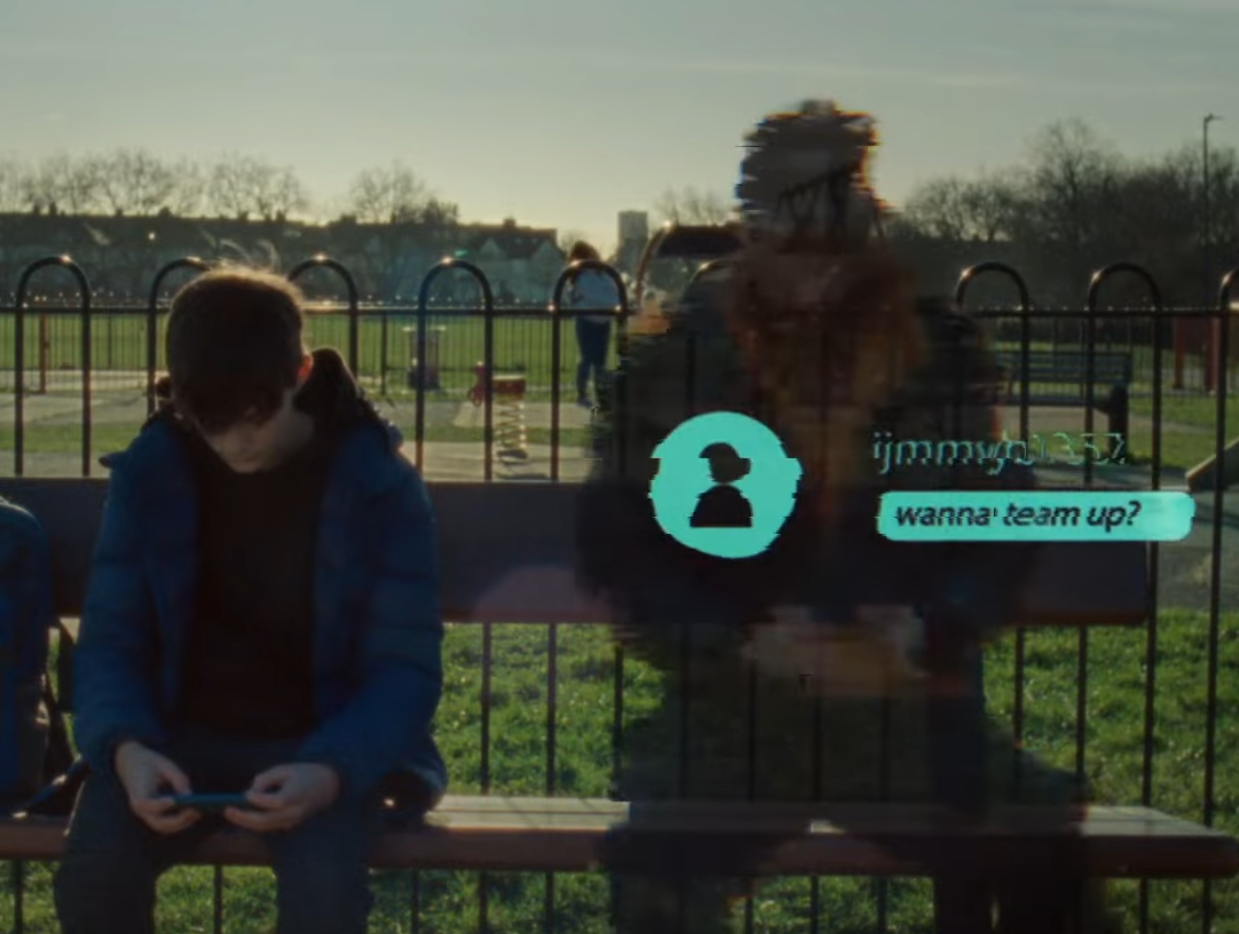
As India McKinney said in her Defcon talk this year, it hard for a politician to be against a bill that claims to be protecting children from abuse. Voting against "protect the children" is pretty much the fastest way to kill your political career and the people pushing these ads know this. During the post-9/11 it was the fear of terrorists that lead to the passing of the Patriot Act and anyone voting against that bill at the time faced being called a traitor.
This ad is a literal cyber-boogeyman, wobbling with scan-lines eerily like a ghost from your nightmares. Straight-up scaremongering.
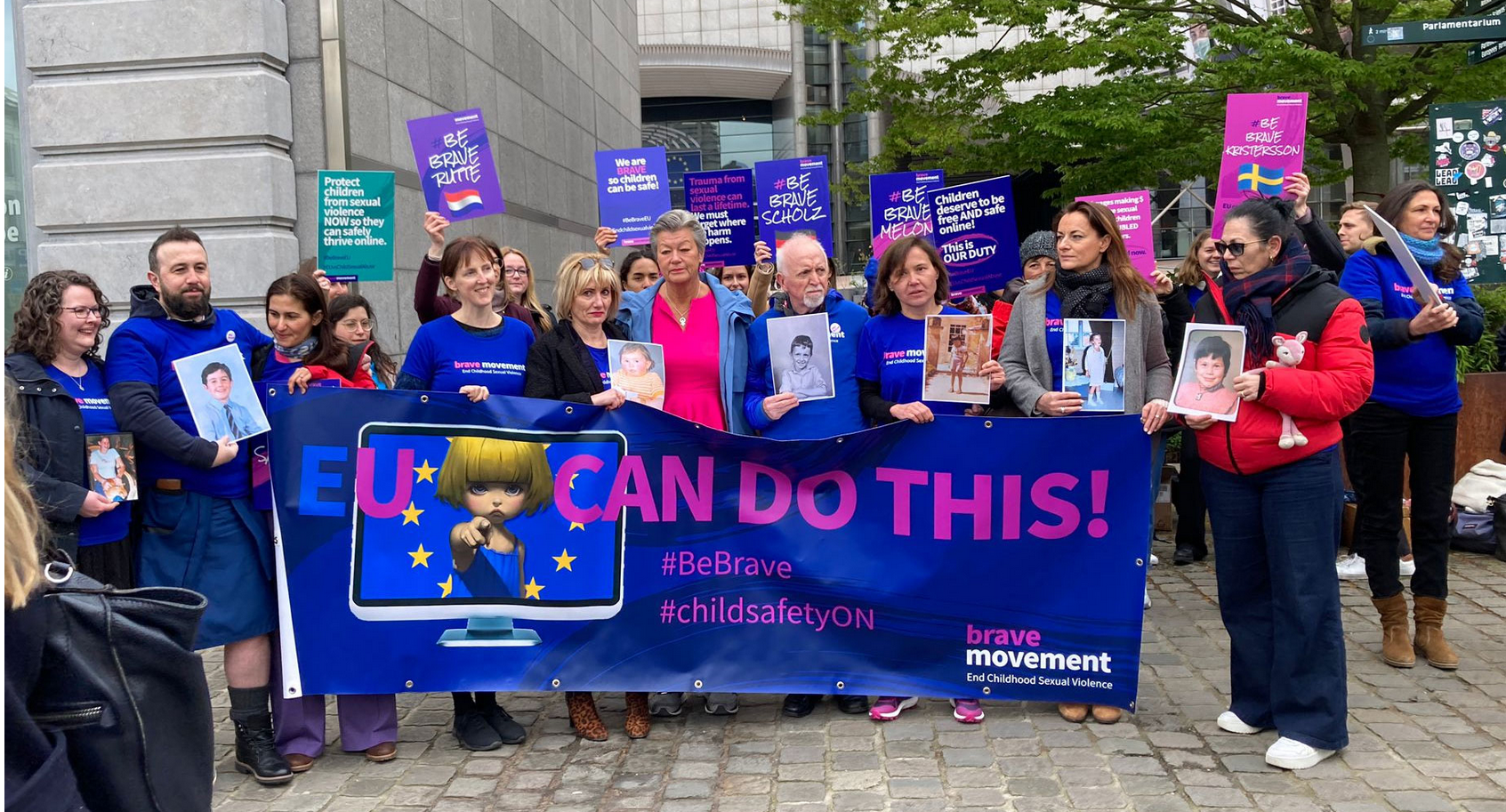
Next is a banner I recently saw in a picture of a demonstation in front of the European Parliment by the Brave Movement. The Brave Movement began in April 2022 and has a very close relationship with Ylva Johansson, the EU home affairs commissioner, who has been actively advocating for the passing of ChatControl 2.0, legislation that would greatly diminish online privacy rights.
The banner in the picture show what appears to be a child in front of the EU flag, pointing directly at the viewer in a stance familiar from Uncle Sam recruitment ads, asking the viewer to "be brave" and fight for weakening privacy protections online. The child looks determined but not angry with a doll-like expression. I think the child is modeled after Cosette from Les Miserables, calling upon memories of the downtrodden character's condition to elicit sympathy.
The European Commission has now been running ads for ChatControl 2.0 on Twitter, showing adults and children on phones and computers in black and white with ominous music playing in the background. The ad ends with the sound of a clock ticking, as if there is the time to act is now.
There is evidence uncovered by Danny Mekić that this political ad was illegally targeted to exclude specific groups of people. This goes against current laws in the EU prohibiting targeted political ads.
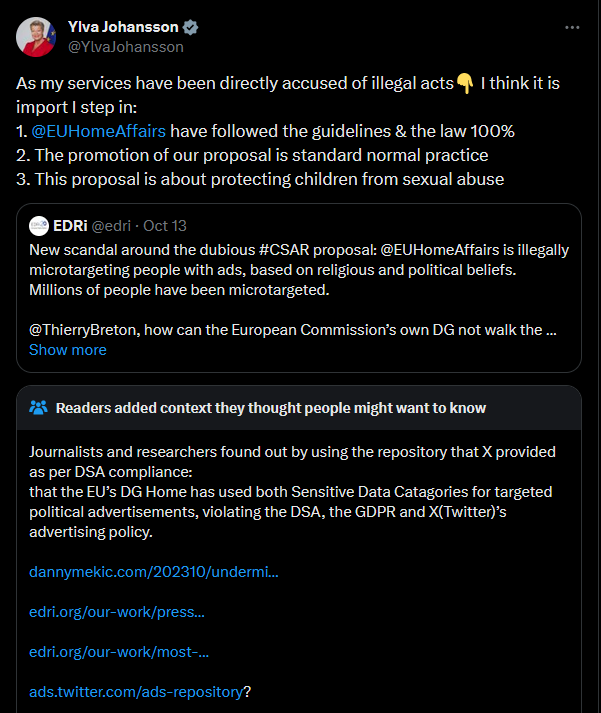
The Home Affairs Commissioner Ylva Johansson responded to these claims of illegal activity by saying this ad was run under their standard normal practices, implying that the European Commission targets all of their political advertising, which is illegal.
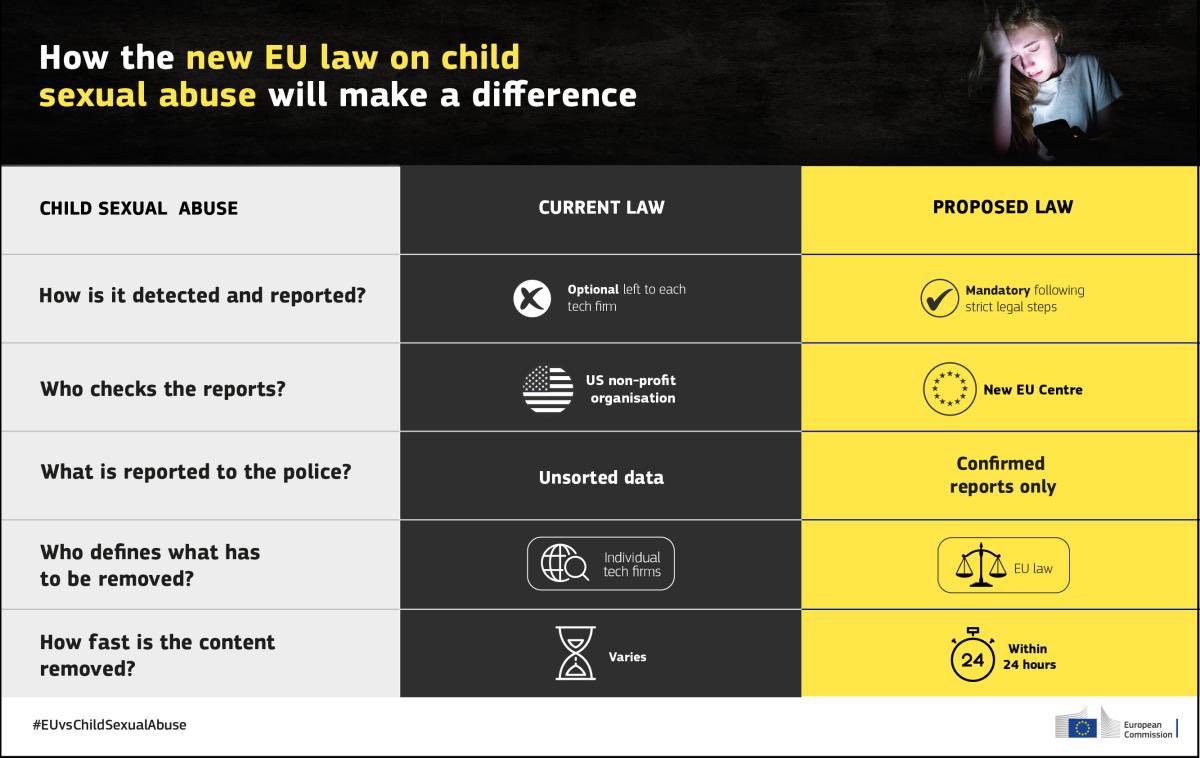
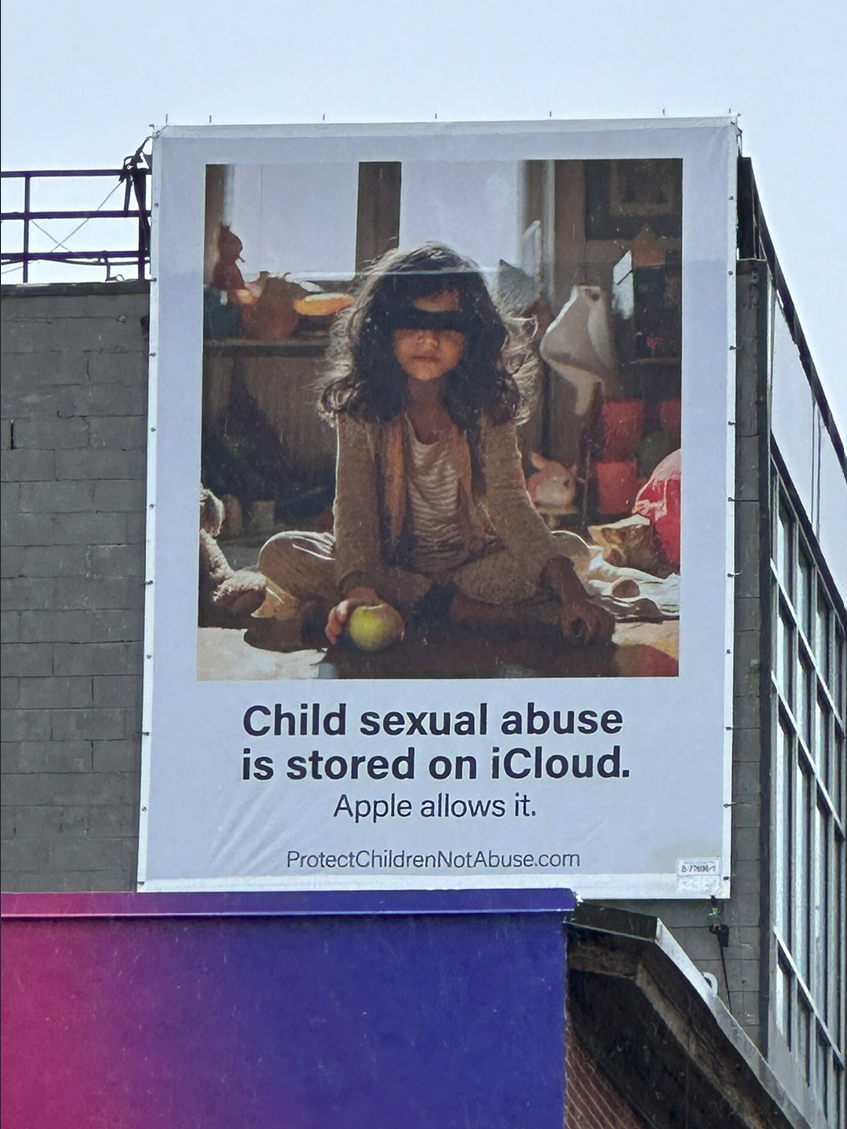
ProtectChildrenNotAbuse.com, a site calling for Apple to go forward with their on-hold plan to pre-emptively scan all iPhones and iCloud accounts for CSAM material.
This ad is unapologetically graphic and accusatory: a child with blacked-out eyes is looking at the camera, apple in hand, bold, unambiguous text underneath which simply says in bold black lettering "child sexual abuse is stored on iCloud". Note the choice of words: this isn't referring to "material" or "pictures". The actual abuse is being housed on Apple's servers, as if it was offering some find of physical haven to criminals. The background of the image shows a messy room that could be found anywhere but is messy and unorganized, a picture that is ordinary but ominous simultaneously.
This image was so disturbing, my girlfriend saw me saving it for this article and was asking what was I doing exactly and is it legal to even have pictures like that on my computer. The campaign website claims all the images are generated with generative AI, which disturbs me a whole lot. If this kind of disturbing images can be cooked up for an ad campaign, I really don't want to know what else this kind of model is capable of.
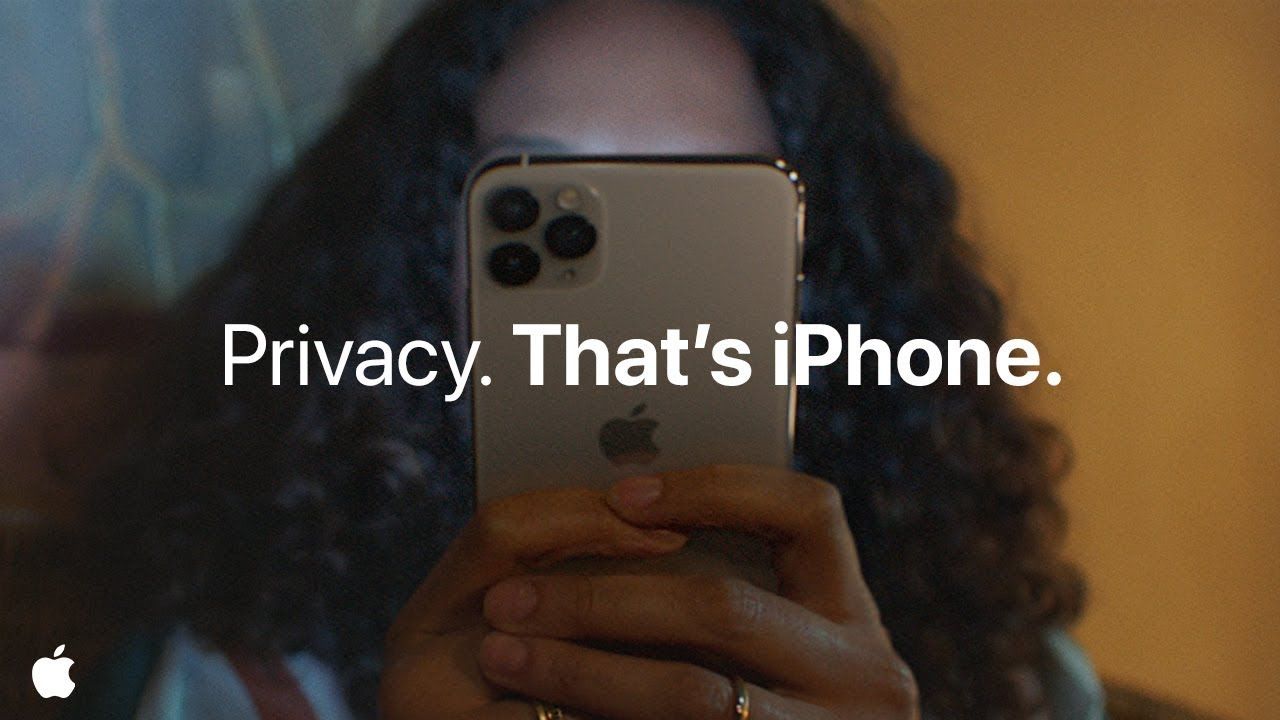
Now on the other side of the privacy debate, Apple took a strong and controversial stance on privacy before in 2016 they refused the FBI's request to unlock a iPhone that was owned by a terrorist. For many this was a watershed moment: a large company had publicly faced off against the US government,wanting to protect privacy on a fundamental level. To some, Apple "protecting" a terrorist's privacy was akin to treason, but to others it showed that Apple would defend users, even those it found deplorable. Apple wasn't about to defend the acts of a terrorist but it stood by the the principle of user privacy. Since then Apple has been the public champion of privacy in the media and the company has used this image their advertising.
This ad showcases the iconic iPhone design covering the face, and thus identity, of the person holding it. Both the person's hands are in focus in the picture, wrapped around the phone tightly, both thumbs on the screen, implying the person is focused on a private conversation. The smart phone has become the most intimate possession a person usually owns. We communicate with our loved ones with it every day. It is the device we use to document our lives: pictures, videos, conversations. Surely if our phones are not private, we walk in this world with no secrets at all. The picture depicts an intimacy almost everyone has experienced when using their phones and makes privacy seem less like a way to hind shameful secrets and more like a way to protect was we cherish most.
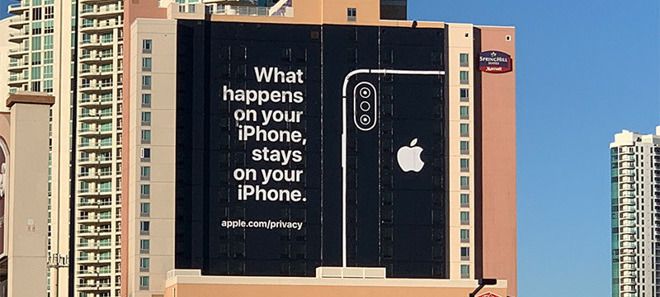
Apple faced a lot of scrutiny for their plans to scan user data for CSAM but this was eventually dropped due to massive user cashback.
This ad is simply black and white, making it easy to see the text and image of the iPhone but also implying that the issue of privacy is a simple one: a black and white issue of having privacy or not having it. The link to apple.com/privacy invites the viewer to look see for themselves how seriously Apple takes privacy and is signalling that Apple's privacy features are clear enough for anyone to understand and not the indecipherable legalese of a ToS agreement.
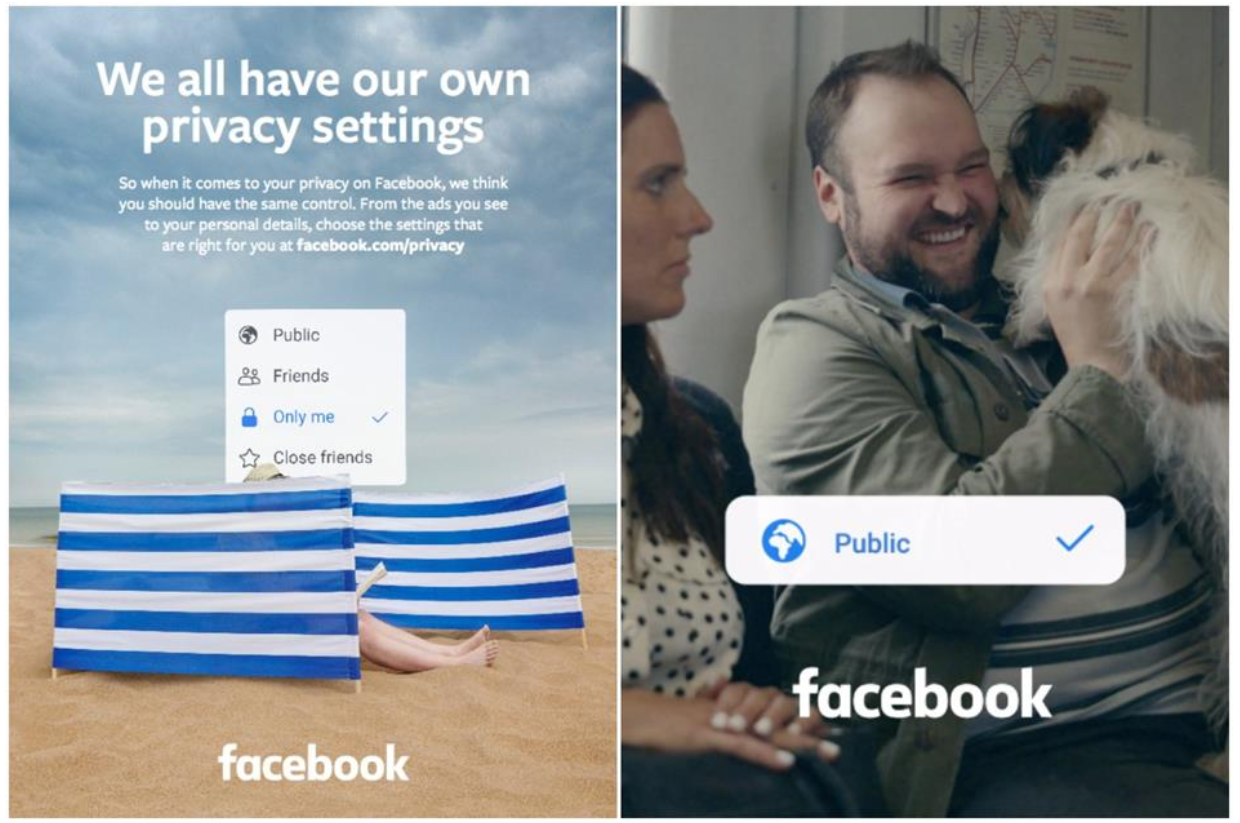
In the aftermath of the Facebook-Cambridge Analytica scandal, Facebook put out ads trying to save face and make their users feel like they had some modicum of control over the data they shared on their platform.
These two ads juxtapose the fundamental paradox of human existence: one side that wants to hide what we are, to have things that are ours and only ours, and the other that wants to share and be happy with others.
The ad for privacy seems to be showing a person changing into a swimsuit by the beach: easily relatable experience that universally is seen as a private event. However changing into a swimsuit is a quick event, quickly passing by and forgotten as the day goes by. Is privacy comparable?
The ad for sharing on the other hand shows a smiling person with a dog, the kind of image anyone with a Facebook account has likely shared at least once and has seen countless times before. The human face, smiling and full of joy, invites connection and empathy. It surely is better to share in one's joy that to worry about privacy? If you have nothing to hide, why do you even need privacy anyway? I also enjoy the stern disgusted expression on the person's face to the left. Sour grapes, clearly hates dogs and finds the disgusting, typical privacy advocate.
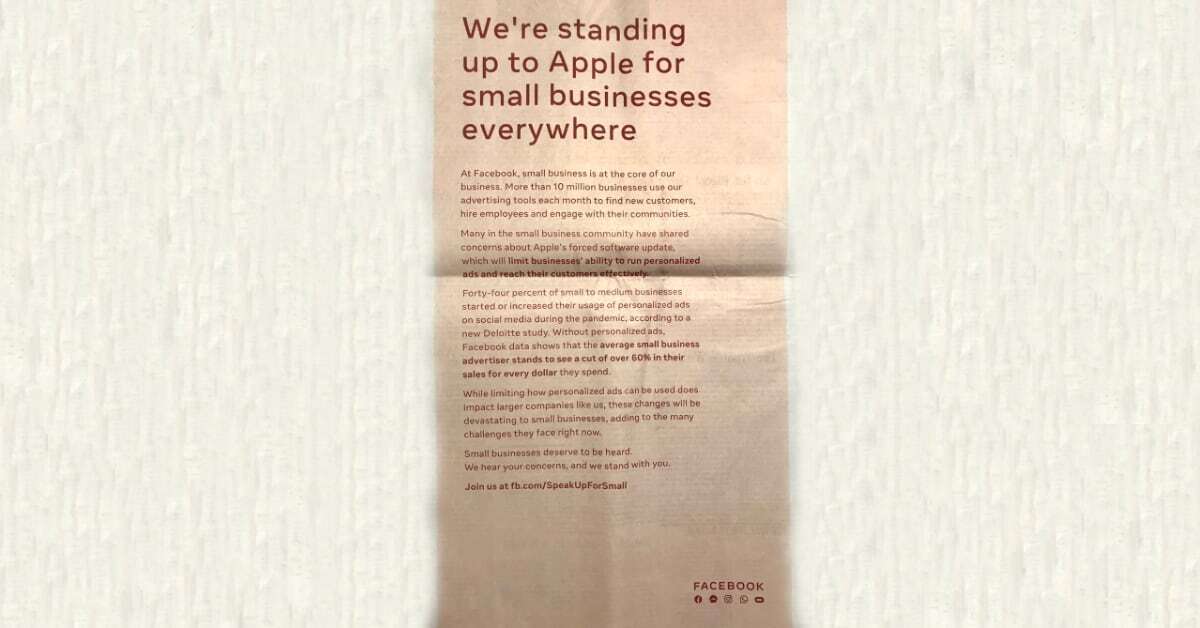
A print ad taken out by Facebook in opposition to Apple's stronger privacy protections on iPhones. Facebook framed privacy protection as harming small businesses who could no longer target their ads as effectively. The data collected by Facebook is framed in the ad as only being used to target more relevant ads to users and that this helps both the user and the business.
Many sources have reported that one of the main reasons Facebook made such a massive push towards the metaverse was due to losing so much revenue to these iOS privacy changes and wanting to avoid issues like this in the future by becoming the company that produces the hardware their software runs own.
It was from 2020 onward where the two main opposing companies of the privacy debate became to be seen as Apple vs. Facebook.
This ad is invoking the imagery of a modest and humble public plea. Instead of going for a slick and polished ad with pictures and scenes of smiling people, conjuring up emotions in the viewer, this ad tries to seem more like a simple face-to-face reckoning with the users of Facebook. I am almost seeing that classic Norman Rockwell painting, Freedom of Speech, in my minds eye as I read the copy until I remember that Facebook is one of the largest companies in the world and has the funds to run this ad in all the world's largest English-language newspapers.
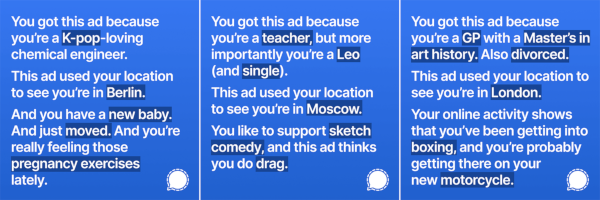
After WhatsApp changed their terms of service , millions of people began looking for an alternative messaging app to use. WhatsApp is owned by the same company that owns Instagram and Facebook. There really does seem to be a limit to how much a company can violate user's privacy until to begins to be seen in their bottom line.
The Signal messaging app took advantage of this situation by running an ad on Instagram targeted users and show them exactly what kinds of information was associated to the account viewing the ad. Every account would see a fairly customized version of the ad showing what interests and life statuses Facebook had linked to that account. Meta, the parent company of Facebook and Instagram, had been facing widespread distrust from many users after the Cambridge Analytica scandal broke and after this ad had circulated on the platform for a few days, the bad publicity was too much and the ad was pulled completely and Signal's Instagram account was suspended.
Signal describes the mentality behind the design of the ad campaign in the following way:
Companies like Facebook aren’t building technology for you, they’re building technology for your data. They collect everything they can from FB, Instagram, and WhatsApp in order to sell visibility into people and their lives.
This isn’t exactly a secret, but the full picture is hazy to most – dimly concealed within complex, opaquely-rendered systems and fine print designed to be scrolled past. The way most of the internet works today would be considered intolerable if translated into comprehensible real world analogs, but it endures because it is invisible.
However, Facebook’s own tools have the potential to divulge what is otherwise unseen. It’s already possible to catch fragments of these truths in the ads you’re shown; they are glimmers that reflect the world of a surveilling stranger who knows you. We wanted to use those same tools to directly highlight how most technology works. We wanted to buy some Instagram ads.
It's unforunate not many people outside of some privacy circles who follow Signal's blog even remember this ad campaign anymore.
What I like about this ad is the simplicity of it. The contrast between the white text and the logo against the "Signal blue" accentuates the simple transparency of what the ad is trying to say: you are being watched. This simplicity is able to give viewer a mild case of the creeps without the ad seeming malicious or threatening. You end up just hating Instagram for allowing this kind of privacy violation to just serve you an ad.
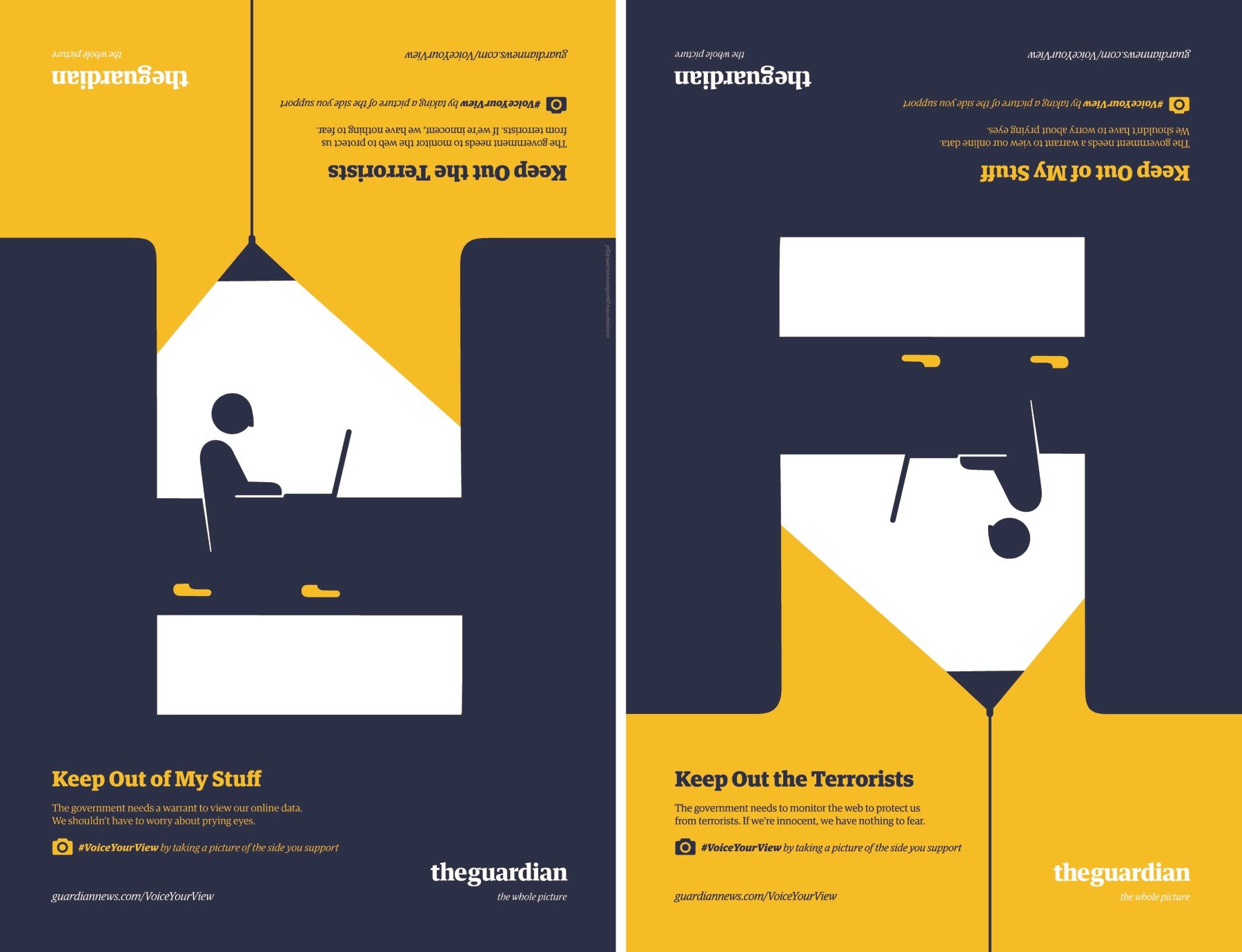
As a final advertisement, I want to showcase one from way back and depicts a different danger that privacy would unleash. In 2013 the Guardian ran a series of ads in the US that set out two sides of an political argument. One of the chosen binary issues was about online privacy. Should the government only monitor your online activity if they have a warrant or is that helping the terrorists? This was some 10 years after 9/11 but the global war on terror was the main lens through which most people saw online monitoring. This ad was created before Snowden came out with his revelations, so the public was still unaware of how pervasive the US government's surveillance of the internet actually was.
The way this issue is framed, as a polar binary of either/or, is very American and pretty much how this issue is still seen in most parts of the US. Before Snowden made clear how very real the NSA's surveillance was, this issue was seen as a more theoretical dilemma you might argue over with your friends over beers. The average person would never imagine themselves as being targeted for monitoring by a government agency, so mostly you might be tempted to see the argument for privacy as protecting the rights of "people of interest" who wandered to the wrong website and ended up accidently flagged as terrorists.
Then Snowden came along and showed the world just what kind of fucked-up Panopticon the internet has become and then the issue went from a fun intellectual challenge to mull over and become an actually reality. It's one thing to think about what you might do if the government was targeting you. It's something completely different when you wake up to find out your life online is an open book to any American federal agency. Shit gets serious quickly.
Now in the 2020's, we don't fear terrorists all that much and given the civil strife in the US, most right-wing extremist groups fear the federal government more than Islamic terrorists. How times have changed.
So I see this ad as a throw-back, those weird 10 years after 9/11 when terrorism was the boogieman and most people in the Western world looked to their governments for all the answers, even if it meant those governments went snooping around a little too much.
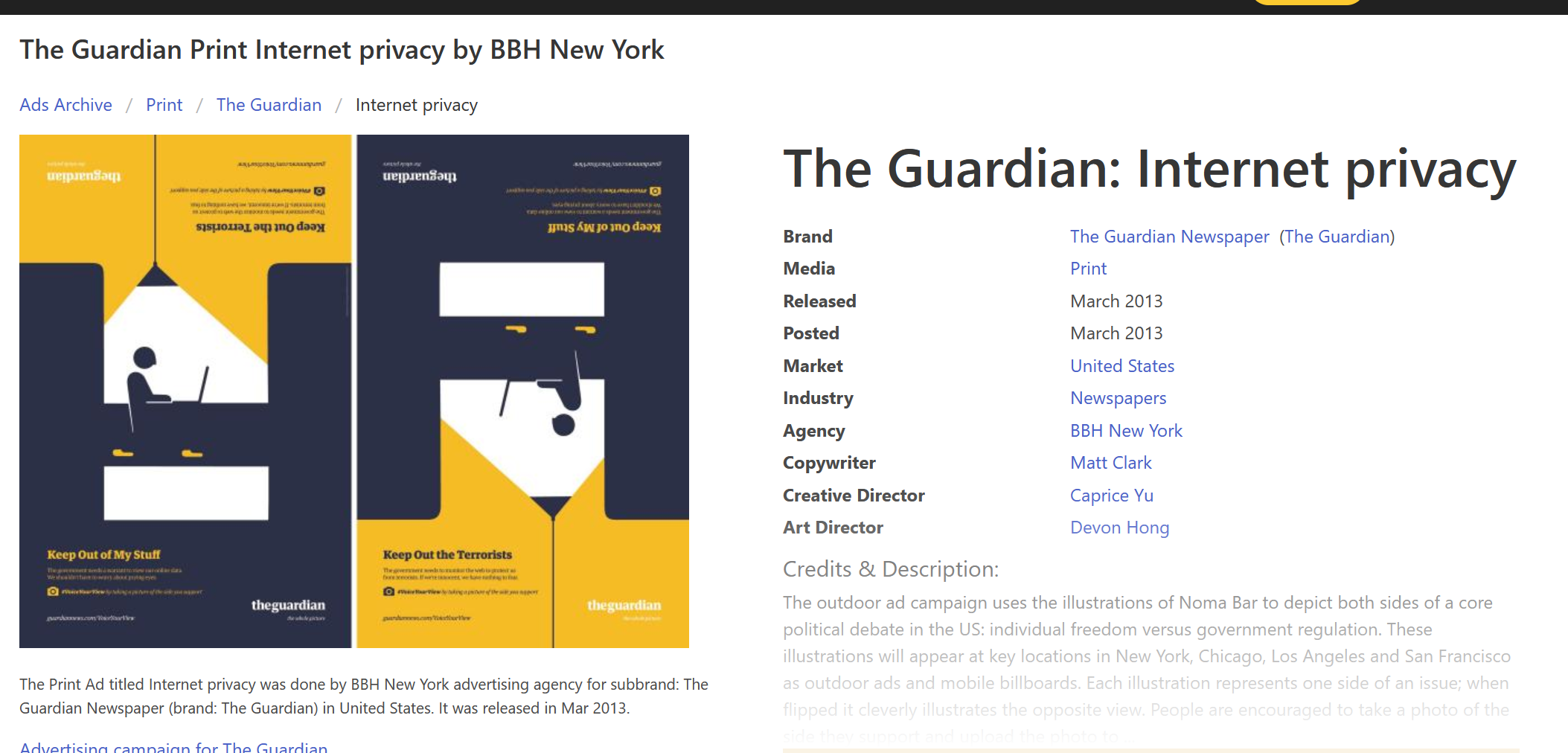
This was it for my round-up of privacy propaganda and my reviews of it. If you think I'm way off base and want to tell me I'm wrong, send me an email or yell at me on Mastodon. If you have more privacy ads you want to share with me, send them my way!